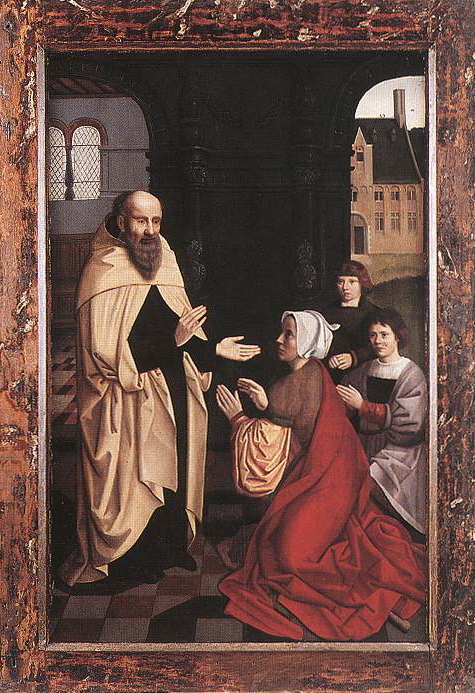After a shaky start, Cantata Singers’ “Elijah” finds its footing with superb soloists
The best concert value in town Saturday night was the Cantata Singers’ performance of Mendelssohn’s oratorio Elijah at New England Conservatory’s Jordan Hall: a bedrock work of the choral repertoire, sung and played by over a hundred very capable musicians, two and a half hours of masterful music, all free of charge.
Financial support from Boston’s Free for All Concert Fund made it possible for the Cantata Singers to put on this open-house event as a centerpiece to the ensemble’s 50th anniversary season.
The other unusual feature of this Elijah was that it was sung in German, the language Mendelssohn was setting when he composed most of the music. Because of a commission from a music festival in England that prompted the composer to finish the work, Mendelssohn’s projected Elias became Elijah, its premiere was sung in English, and a new member joined the sainted brotherhood of English oratorios by German composers.
In a note in Saturday’s program, Cantata Singers music director David Hoose argued that this music fits its German text better than the familiar English one. Saturday’s performance gave no reason to doubt that, and meanwhile the sarcasm and rages of the crotchety old prophet, in baritone Mark-Andrew Cleveland’s superb performance, had the kind of bite auf deutsch that would be hard to achieve in any other language.
But such pleasures still lay ahead in the performance’s early going, when unfortunately it appeared that the non-paying audience might end up getting its money’s worth. Despite Hoose’s clear direction from the podium, the orchestra of freelancers sounded out of everything—balance, tune, sync, and sorts—and the chorus didn’t seem engaged with the drama, singing with the same generic choral sound and soft attack whether happy or sad, fearful or angry.
For his part, Hoose skimped on the long silences following the priests’ cries of “Gib uns Antwort, Baal!” making it sound as if, having called their false god, they weren’t bothering to wait for an answer.
Dramatic excitement picked up, however, toward the end of the oratorio’s Part I, as the prophet summoned drought-ending rain, a boy (pipingly sung by soprano Kynesha Patterson) heralded the approaching storm clouds, and the chorus brought down the act-one curtain with a lively hymn of praise to all-powerful God.
Following a long intermission, soprano Janet Brown’s rendering of the double aria “Höre Israel/Ich bin eure Tröster” kept the music-making on a highly expressive level, affirmed by the lively chorus and orchestra in the following number, “Fürchte dich nicht,” and after that things went much better for this performance.
Throughout the evening’s ups and downs, a reliable bright spot was the work of the soloists and small ensembles, consistently fine from Cleveland in the title role to the briefest shout from the crowd. Over a dozen members of the ensemble (Cleveland is one himself) were featured in this way, often stepping out of the ranks and onto platforms amid the orchestra to take their solo turns.
To cite just a few examples, mezzo-soprano Lynn Torgrove was highly effective in the darker roles, be it the prophetess of doom in “Weh ihnen” or the spiteful Queen stirring the crowd to a vengeful frenzy in “Habt ihr’s gehört.” Emily Marvosh was the bell-toned, all-purpose alto in roles ranging from devotional ensembles to the Angel bucking up the prophet in “Stehe auf, Elias.”
Marvosh joined Brown and mezzo-soprano Jennifer Webb in a delectable rendering of the angelic a capella trio “Hebe deine Augen” (Lift thine eyes), familiar to many listeners as a women’s chorus. William Hite’s clear, frank tenor sound and fine diction as the good priest Obadiah made him an excellent Horatio to Elijah’s Hamlet.
Elegant, forward-placed and creamy, baritone Cleveland’s voice seemed at first almost too pretty for the role of the prickly, annoying prophet, “he that troubleth Israel.” But when the singer got spitting mad in Part I’s sacrifice scene (“So wahr der Herr Zebaoth lebet”), he lit a fire under Saturday’s performance as surely as the Almighty roasted the sacrificial bullock.
Cleveland’s expressive range extended from righteous wrath to spiritual crisis in the crucial aria “Es ist genug,” and even to that remarkable Garbo-laughs moment late in the work when the smiling (!) prophet breaks into a three-to-a-bar soft shoe (“Ja, es sollen wohl Berge weichen”).
With a strong Elias/Elijah at its center, and the other principal character—the chorus—growing increasingly confident and expressive as the evening went on, and all the solo fielders playing their positions well, this was a performance of Mendelssohn’s oratorio one would pay real money to hear.
The next presentation of the Cantata Singers will be a chamber concert, “Mostly Mendelssohn and Friends,” at the Goethe-Institut Boston, 3 p.m. Sunday, March 30. cantatasingers.org; 617-868-5885.
Posted in Performances
